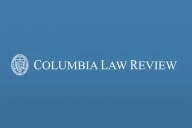You have /5 articles left.
Sign up for a free account or log in.
Marquette University has suspended with pay and barred from campus the tenured professor who criticized a graduate student instructor in a personal blog, pending an investigation into his conduct.
John McAdams, an associate professor of political science at Marquette, last month wrote a controversial blog post accusing a teaching assistant in philosophy of shutting down a classroom conversation on gay marriage based on her own political beliefs. He based the post on a recording secretly made by a disgruntled student who wished that the instructor, Cheryl Abbate, had spent more time on the topic of gay marriage, which the student opposed. McAdams said Abbate, in not allowing a prolonged conversation about gay marriage, was “using a tactic typical among liberals,” in which opinions they disagree with “are not merely wrong, and are not to be argued against on their merits, but are deemed ‘offensive’ and need to be shut up.”
The story was picked up by various other blogs, and the second-year graduate student soon received critical messages via email, regular mail and online comment boards – some of which included lewd or profane remarks or threats. She also received support from academics across the country, many of whom accused McAdams of violating his ethical and pedagogical responsibilities towards all Marquette students, even teaching assistants.
McAdams defended his actions, including in an interview with Inside Higher Ed last month, saying that even though Abbate was a student, she was also a teacher with “authority” over her students. Abbate, meanwhile, accused McAdams of giving her less than a day to respond to a request for comment for his post, and of various errors and omissions in his story. Among them was not mentioning that she discussed the student’s concerns with the class at their next meeting to explain why the topic of gay marriage was not the best example of the specific philosophic principle they were studying.
Over the past month, the professor shared ongoing reactions from colleagues and readers on his conservative-learning blog, Marquette Warrior. This week, he shared the news of his suspension, saying that Marquette has “shown itself to be timid, overly bureaucratic and lacking any commitment to either its Catholic mission or free expression.”
“Whether Marquette officials really want to punish us for blogging, or whether they simply feel the need for a pro forma ‘investigation’ of changes someone has brought, we don’t know,” McAdams wrote. “Either would be gross misconduct on the part of Marquette officials. Any attempt to censor our blog not only would violate the canons of academic freedom, but would reverse years of precedent, since we have been free to criticize things going on at Marquette for nearly years now.”
McAdams shared the text of an email he received from Richard Holz, dean of the Helen Way Klinger College of Arts and Sciences.
“The university is continuing to review your conduct and during this period -- and until further notice -- you are relieved of all teaching duties and all other faculty activities, including, but not limited to, advising, committee work, faculty meetings and any activity that would involve your interaction with Marquette students, faculty and staff,” Holz wrote.
The dean added that McAdams is to remain off campus until further notice, and must seek consent before visiting campus for any reason.
McAdams said he wrote back, asking for explicit charges, but has not been given any. He said he assumes it’s about Abbate.
Brian Dorrington, a university spokesman, said via email that he could reveal some information about McAdams’s case, given that he “has shared his personnel information on his public blog.”
Dorrington said that Marquette has been reviewing since last month “both a concern raised by a student and a concern raised by a graduate student teaching assistant. While this review continues, [McAdams] has been relieved of his teaching duties and other faculty duties. His salary and benefits will continue during the course of the review.”
The spokesman also pointed to a Nov. 22 memo – sent days after the story broke -- from President Michael R. Lovell to faculty, staff and students affirming the university’s commitment to “respect, professionalism and academic freedom.”
“I believe all these values must be present if we as a community are able to have productive discussions, even in the midst of disagreements,” Lovell said in his letter. “This is a matter of official policy, but it’s also a matter of our values. Respect is at the heart of our commitment to the Jesuit tradition and Catholic social teaching.”
Lovell added: “We are dedicated to uphold academic freedom and to maintain an environment in which the dignity and worth of each member of our community is respected, especially students. We deplore hatred and abuse directed at a member of our community in any format.”
The president said the university listens to “any member of the campus community who expresses concerns alleging inappropriate behavior,” and said Marquette “will not tolerate personal attacks or harassment of or by students, faculty and staff,” according to its harassment policy.
McAdams in his most recent post criticized that policy as “absurdly vague” in that it includes behavior that is “intimidating, hostile or demeaning or could or does result in mental, emotional or physical discomfort, embarrassment, ridicule or harm.”
The professor wrote: “That’s right, even mental discomfort (which should be a normal part of having one’s opinions challenged in a university) is considered harassing.”
McAdams agreed to be interviewed, but did not call back by deadline. Abbate did not immediately respond to an interview request.
Nancy Snow, chair of the philosophy department, declined comment.
Roberta Coles, a professor of sociology at Marquette who has been critical of McAdams, said, “it has been a series of incidents […] not just this one with Ms. Abbate. She’s just the straw that broke the camel’s back, so to speak.”
Coles didn’t elaborate, but McAdams often discusses controversial issues on his blog, including how he faced a complaint last year after discussing “bogus” rape statistics in his class.
“We point out that feminists insist that if a woman consents to sex under the influence of alcohol, she has been raped," McAdams wrote. “We typically add ‘if you wake up in the morning and ask, 'what in the world did I do?' ” you haven’t been raped. If you’ve been raped you feel violated. If it requires a feminist political activist to explain to you how what happened was rape, you weren’t raped.’”
Coles said she’d told McAdams via email that since Abbate “is a student and we are teachers/mentors, a more appropriate way would have been to talk to her directly about how she could incorporate various views into the classroom in a non-offensive way.”
Brandon Buck, a doctoral fellow in philosophy and education at Teachers College at Columbia University who received a master’s degree in education policy and foundations at Marquette, but who has never met McAdams or Abbate, also has been publicly critical of the professor’s approach with a student at his institution.
“McAdams's position and Abbate's status imply a kind of sacred relationship between the two,” Buck said via email. Yet “McAdams did nothing to help Abbate grow as a person, [and] instead he did everything to stomp her down as a person. He didn't just violate the trust implied in the special relationship, he made a public mockery of it.”
Justin Weinberg, an associate professor of philosophy at the University of South Carolina, has defended Abbate on his blog, Daily Nous. He also said there were better ways for McAdams to address the classroom discussion with Abbate.
“If he had sincere concerns about her teaching decisions, I believe an email expressing such concerns to her and seeking further details, copying her adviser or chair, would have been appropriate,” Weinberg said. “Apparently, he thought it was more important to score political points with his blog readers than to fulfill his duties as a member of the Marquette faculty.”
Weinberg said he thought Marquette’s disciplinary action seemed an “appropriate first step,” as the university continues its investigation.
According to procedural standards recommended by the American Association of University Professors, suspension from teaching and other primary duties is a severe sanction second only to dismissal. It should only occur if there is a perceived threat of immediate harm, but only after the administration consults with a duly constituted faculty body “concerning the propriety, the length, and the other conditions of the suspension.”
It’s unclear if a faculty body was consulted prior to the dean’s decision. Dorrington did not respond to a question about process. He said in earlier statement that Marquette “has protocols in place for students who have concerns related to academic matters or any other issues.” Faculty members who express concerns “alleging harassment may also refer concerns through standard channels of authority – an associate dean, dean of the college or the provost,” he said.
Asked whether blogging negatively about a graduate student constitutes immediate harm, Greg Scholtz, director of academic freedom, tenure and governance at AAUP, said the question is one which administration should discuss with a faculty body.
“It would be that body’s responsibility to advise the administration whether [McAdam’s actions] constituted harm or, more importantly, the threat of further harm,” Scholtz said.









